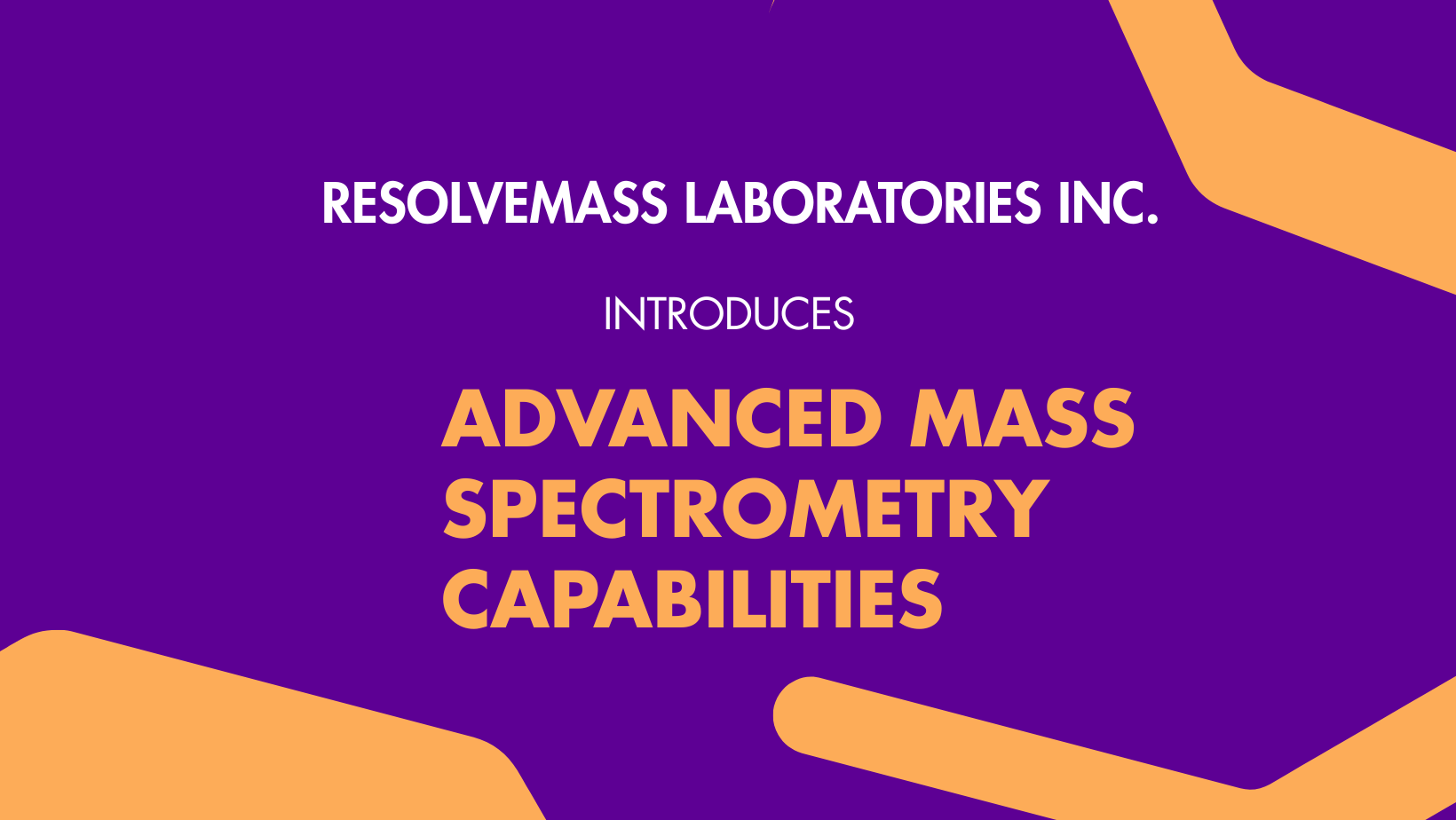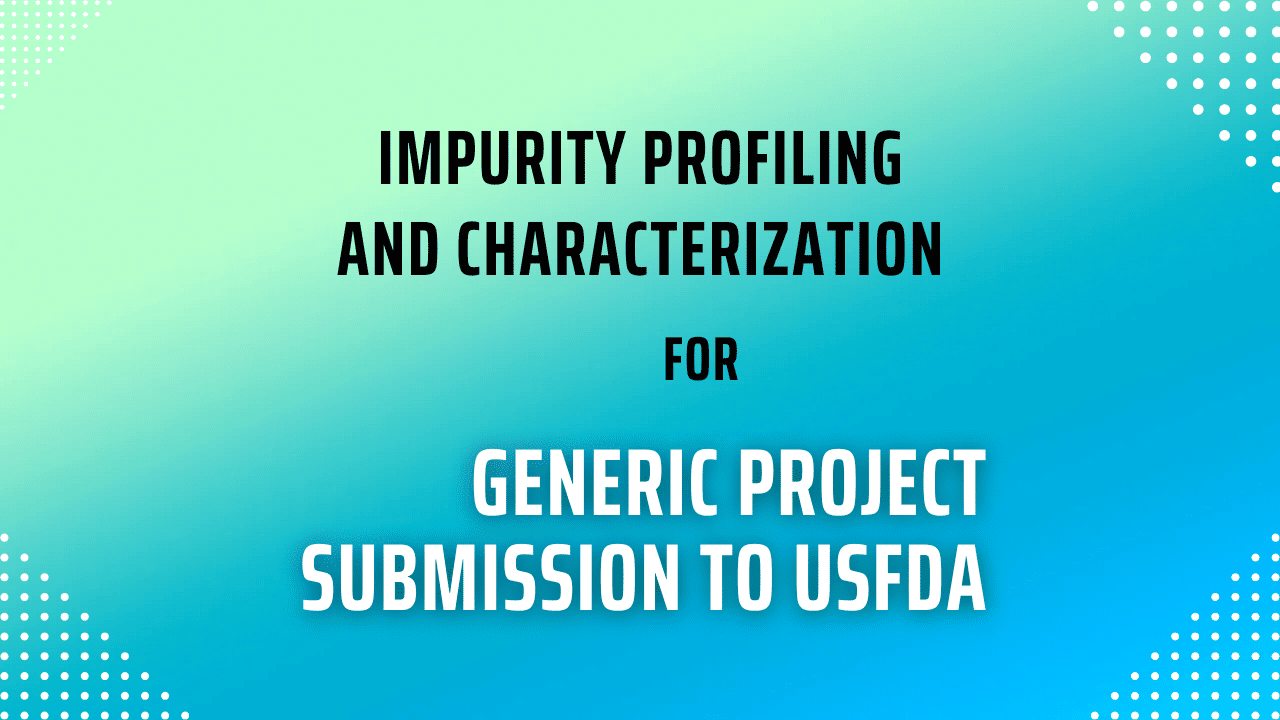Introduction
In the competitive pharmaceutical landscape, Impurity Profiling for Generic Drug Project submissions to the USFDA has become a cornerstone for regulatory compliance. Impurity profiling and characterization play a pivotal role in ensuring the safety, efficacy, and quality of generic drugs. At ResolveMass Laboratories Inc., we provide advanced analytical and regulatory support to streamline generic drug submissions. With years of experience and a highly skilled team, we specialize in Impurity Profiling for Generic Drug Project submissions, offering customized, precise, and compliant solutions that meet the rigorous expectations of the USFDA.
Importance of Impurity Profiling for Generic Drug Project
What is Impurity Profiling for Generic Drug Project?
Impurity Profiling for Generic Drug Project involves the identification, quantification, and structural characterization of impurities present in pharmaceutical substances and products. These impurities may originate from raw materials, manufacturing processes, or degradation pathways.
Types of Impurities Considered in Generic Drug Projects
- Organic Impurities: Residual starting materials, by-products, and degradation products.
- Inorganic Impurities: Catalysts, ligands, or salts used in synthesis.
- Residual Solvents: Solvents used in manufacturing that must be controlled.
- Degradation Products: Compounds formed through chemical instability over time.
Regulatory Guidelines by USFDA for Impurity Profiling
The USFDA refers to ICH guidelines such as ICH Q3A (R2) and ICH Q3B (R2), setting thresholds and evaluation standards for:
- Reporting Thresholds
- Identification Thresholds
- Qualification Thresholds
Compliance with these guidelines is critical for a successful Impurity Profiling for Generic Drug Project submission.
Our Analytical Techniques for Impurity Profiling
ResolveMass Laboratories employs state-of-the-art techniques to deliver accurate impurity profiling:
Chromatographic Techniques
- HPLC (Explore HPLC Capabilities)
- GC & GC-MS: Ideal for volatile and semi-volatile impurities.
Spectroscopic Techniques
- Mass Spectrometry (MS)
- NMR Spectroscopy (Learn About Our NMR Services)
- FTIR Spectroscopy
Hyphenated Techniques
- LC-MS/MS and GC-MS/MS for precise impurity characterization.
Complete Service Suite for Generic Drug Projects
At ResolveMass, our services ensure end-to-end coverage for Impurity Profiling for Generic Drug Project submissions:
Method Development and Validation
- Accuracy, Precision, Linearity, Specificity, Robustness
HRoutine Impurity Testing
- Impurity comparison with Reference Listed Drug (RLD)
- Long-term stability studies
Impurity Isolation and Structural Elucidation
- Preparative chromatography
- Advanced spectroscopic analysis
Regulatory Documentation and Support
- Validation reports, impurity tables, qualification data
- Strategic consultation for submission readiness
Real-World Case Study – PLX-315 Generic Submission
A mid-sized pharmaceutical firm approached ResolveMass Laboratories for Impurity Profiling for a Generic Drug Project targeting anti-inflammatory drug PLX-315.
Challenges:
- Multiple unknown low-level impurities (<0.05%)
- High impurity complexity due to multi-step synthesis
Our Approach:
- Method Development: Customized HPLC method with LOD at 0.005%
- Structural Characterization: Employed LC-MS/MS and 600 MHz NMR to characterize 6 unknowns
- Qualification: One impurity required toxicological qualification via Ames test
Outcome:
- Completed full impurity dossier within 8 weeks
- Supported a successful ANDA submission
- Drug approved by USFDA within 6 months
Why Choose ResolveMass for Impurity Profiling for Generic Drug Project
- Decade-long experience in pharmaceutical impurity profiling
- GxP-compliant facilities and methods
- Cutting-edge tools for precise and sensitive detection
- Trusted by over 100+ pharma companies globally
Explore more about our expertise:
- Impurity Profiling Services
- Direct Infusion Analysis
- NMR for Small Molecules
- Peptide Characterization
FAQs
- What is impurity profiling in pharmaceuticals, and why is it important for generic drug projects?
Impurity profiling is the process of identifying, quantifying, and characterizing unwanted chemicals—known as impurities—in a pharmaceutical product. These can arise from the drug synthesis process, raw materials, degradation over time, or storage conditions. For generic drug projects, impurity profiling is essential because the U.S. FDA mandates that generic drugs must match the quality, safety, and efficacy of the reference listed drug (RLD). Proper impurity profiling ensures that the generic formulation does not introduce harmful substances, meets regulatory limits, and qualifies for market approval. Without comprehensive impurity data, USFDA approval is likely to be delayed or denied.
- What types of impurities are typically profiled in generic drug submissions to the USFDA?
Impurities in pharmaceutical products fall into several main categories:
Organic Impurities: These are related to the drug synthesis process, such as unreacted starting materials, intermediates, or degradation products.
Inorganic Impurities: These include reagents, catalysts, and metal residues.
Residual Solvents: Organic solvents that remain from the manufacturing process.
Degradation Products: Compounds that result from the breakdown of the active pharmaceutical ingredient (API) during storage or formulation.
All these types must be detected, quantified, and evaluated for safety, especially if they exceed regulatory thresholds set by the ICH Q3A/B guidelines and USFDA standards. - What are the USFDA’s regulatory requirements for impurity profiling in generic drugs?
The USFDA follows ICH (International Council for Harmonisation) guidelines for impurity profiling. For generic drugs, the most relevant are ICH Q3A(R2) for drug substances and ICH Q3B(R2) for drug products. These outline three key thresholds:
Reporting Threshold: Impurities must be reported if they exceed a certain percentage (e.g., 0.1% for APIs).
Identification Threshold: If an impurity exceeds this level, it must be structurally identified.
Qualification Threshold: Impurities above this level must be assessed for safety using toxicological data.
Resolving these thresholds ensures that a generic drug meets all regulatory expectations and avoids issues during FDA review. - How does ResolveMass Laboratories conduct impurity profiling for generic drug projects?
At ResolveMass Laboratories, we follow a systematic, science-driven approach to impurity profiling:
Method Development & Validation: We tailor analytical methods specific to your API or formulation.
Routine Testing: We conduct batch testing to detect and monitor impurity levels over time.
Advanced Instrumentation: Our lab is equipped with LC-MS/MS, GC-MS, NMR, FTIR, and HPLC for high-precision analysis.
Structural Elucidation: Unknown impurities are isolated and structurally identified using state-of-the-art spectroscopy.
Regulatory Support: We provide full documentation, including ICH-compliant validation protocols and impurity reports for FDA submissions.
Our experience with numerous generic filings positions us as a reliable CRO partner for impurity characterization projects. - What advanced techniques are used for impurity profiling in pharmaceuticals?
We utilize a variety of highly sensitive and specific techniques, including:
High-Performance Liquid Chromatography (HPLC): For separating and quantifying organic impurities.
Gas Chromatography (GC): Especially for residual solvents.
Mass Spectrometry (LC-MS/MS and GC-MS): For molecular weight determination and impurity identification.
Nuclear Magnetic Resonance (NMR): For structural analysis of unknown impurities.
Fourier-Transform Infrared Spectroscopy (FTIR): For functional group identification.
By combining these techniques—often called hyphenated techniques—we provide a holistic impurity profile with high accuracy and compliance. - What is the difference between impurity profiling and stability testing?
While impurity profiling focuses on identifying and quantifying impurities at any given point, stability testing monitors the formation of new impurities over time under different storage conditions (e.g., temperature, humidity). Stability testing helps ensure that the drug:
Remains safe and effective until its expiration date
Meets the regulatory requirement for shelf-life
Avoids formation of harmful degradation products
At ResolveMass, we integrate both impurity profiling and long-term stability studies to deliver a comprehensive picture of a product’s quality lifecycle. - Can low-level impurities impact the approval of a generic drug?
Yes. Even trace-level impurities can impact drug approval if they exceed the reporting, identification, or qualification thresholds. Moreover, genotoxic impurities, even in very small amounts, can pose serious safety risks and require detailed toxicological evaluation. The FDA demands scientific justification and safety data for any impurity exceeding these limits. At ResolveMass Laboratories, we employ ultra-sensitive techniques capable of detecting impurities at parts per billion (ppb) levels to ensure full compliance and minimize regulatory risk.
- How does impurity profiling help establish bioequivalence in generic drugs?
While bioequivalence (BE) primarily compares the pharmacokinetics of a generic drug with its reference product, impurity profiling supports the chemical equivalence and safety of the formulation. A similar impurity profile helps establish that:
No new impurities are introduced in the generic formulation
The manufacturing process is well controlled
The drug meets the same safety standards as the innovator product
This is especially crucial for ANDA (Abbreviated New Drug Application) submissions where the goal is to match the reference listed drug (RLD) as closely as possible. - How long does impurity profiling typically take at ResolveMass Laboratories?
Timelines vary based on project complexity, but our standard turnaround includes:
Method Development and Validation: 2–3 weeks
Routine Impurity Profiling: 5–10 business days
Structural Elucidation of Unknowns: 2–4 weeks
Regulatory Documentation: Concurrent with testing or within 1 week post-analysis
ResolveMass offers expedited services for urgent filings and projects with tight regulatory deadlines. Our streamlined workflow and expert team ensure fast and accurate results. - How can I start a project with ResolveMass Laboratories for impurity profiling?
Starting a project with us is simple:
Visit our Impurity Profiling Service Page
Fill out the contact form or directly reach out via Contact Page
Our technical team will arrange a consultation call to understand your formulation, timeline, and regulatory needs
You’ll receive a custom proposal, including pricing, scope, and project plan
Once approved, our scientists initiate your project with full confidentiality and quality assurance
With ResolveMass Laboratories, you’re partnering with a trusted name in pharmaceutical analytics backed by years of expertise in impurity profiling and regulatory support.
Conclusion
Impurity Profiling for Generic Drug Project submissions is essential for successful USFDA approval. ResolveMass Laboratories offers a full suite of profiling, characterization, and regulatory documentation services. With unparalleled expertise, GxP compliance, and advanced tools, we ensure your generic drug submission is robust, accurate, and approved on time.
Contact Us
ResolveMass Laboratories Inc.: Comprehensive Scientific Expertise You Can Rely On
ResolveMass Laboratories Inc. is a trusted Canadian contract research organization offering a wide spectrum of specialized services spanning polymer synthesis, advanced analytical testing, and custom organic synthesis. With over a decade of experience supporting pharmaceutical, biotech, and industrial clients, we bring scientific precision and regulatory insight to every project. Our core capabilities include Polymer Synthesis and Characterization, Peptide Characterization, Organic Synthesis, Nitrosamine Testing and Analysis, PFAS Testing, and Extractable & Leachable Studies, as well as a broad suite of analytical techniques such as HPLC, GC-MS, MALDI-TOF, NMR, and FTIR.
Our multidisciplinary team includes chemists, analytical scientists, and regulatory experts with advanced academic and industry backgrounds. We excel at developing customized, high-quality solutions—whether you need innovative polymer designs, impurity profiling, or confirmatory testing that meets global regulatory standards.
Clients across North America choose ResolveMass Laboratories for our deep technical knowledge, commitment to quality, and ability to deliver reproducible, reliable data that drives confident decision-making. When precision, innovation, and trust matter—ResolveMass is your partner of choice.
We have PhD level scientist who share this knowledge to you so that you can excel in your impurity identification project. This guide will help you understand all the relevant technical aspects, still if you need more help to understand more in your impurity identification, feel free to book a free consultation with our scientist for your project.
Quick Enqury:
References:

